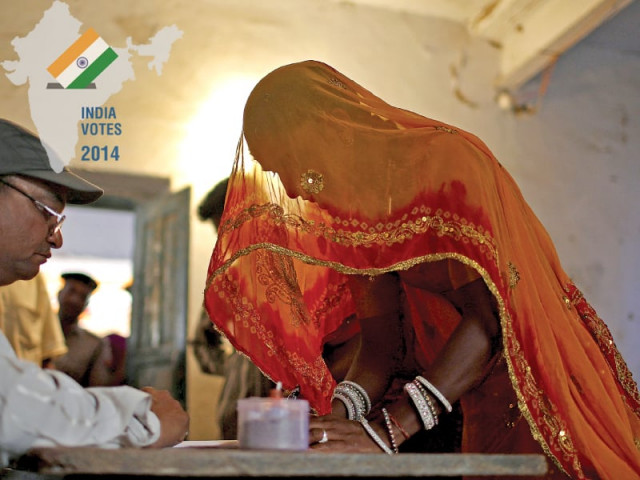Biggest chunk: Turnout remains low in Muslim majority areas
Parties ask voters to not divide votes between Congress and Samajwadi Party.

A polling official checks the identity of a voter inside a polling station in Ajmer district in the desert Indian state of Rajasthan. PHOTO: REUTERS
An average 65-70 per cent turnout, despite the searing heat, marked the end of polling in 121 constituencies out of 543 going to the polls in the general elections—the largest chunk to vote on one day.
Turnout in constituencies with a higher Muslim population, like Rampur in Uttar Pradesh with 48% Muslims, was generally low.
Earlier this week, the All India Muslim Majlis e Mushawarat, an umbrella body of Muslims across India passed a resolution urging all secular voters to use their voting right wisely, with a resolve to defeat fascist and communalist candidates by resorting to tactical voting, making sure not to allow votes to be wasted by division.
This stance was reiterated by the Bahujan Samaj Party (BSP) chief Mayawati on Thursday who asked voters not to waste votes by dividing them between the Congress and the Samajwadi Party because this would ensure BJP’s win.
In first overt pro-Muslim pitch, Mayawati warned that if Modi were to become prime minister, “the country would stand ruined with communal riots” akin to the one in Gujarat in 2002.
At least one Muslim candidate — Mukhtar Ansari of the Qaumi Ekta Dal in UP — has withdrawn from the polls as to not create the divide amongst Muslim voters. Ansari was to contest against Narendra Modi in Varanasi.

BJP’s stance
The BJP, highly criticised for its anti-Muslim stance, too tried to clear its name.
One of the few Muslims representing the party, Mukhtar Abbas Naqvi argued that BJP’s poor reputation among Muslims was ‘undeserved’.
“The BJP’s image has been tarnished by its political opponents through malicious conspiracy,” he said. From his perspective there has been a positive shift in the mindsets of many Muslims over the past two decades.
Recent events, however, have been in stark contrast to the BJP’s stance.
During the communal violence that took place in Muzaffarnagar last year, claiming 65 lives and displacing over 50,000 people, mostly Muslims, BJP refused to condemn the incident, and avoided references to religiously motivated rioting in its campaign speeches.
With most Muslims reluctant to vote for the BJP, the question still stands to who the community will vote for.
Amitabh Kundu, a professor at the New Delhi-based Jawaharlal Nehru University and chairman of a government committee which has evaluated the situation of Muslims in India is of the opinion that if “Given the very limited performance of the present government, I feel there will be some level of dissatisfaction because the Muslims certainly expected a lot from Congress.”
“It is impossible to even think that 180 million people make a unanimous decision and vote along the same lines?” questioned Hilal Ahmad, who researches voting trends among Muslims in India for the Center for Developing Societies of New Delhi.
Supporting Ahmad’s stance, analyst Yashwant Deshmukh said there are about 35 constituencies where Muslims make up approximately 30 per cent of the electorate.
“Then there are another 150 constituencies where Muslim population is close to 10 per cent of the total voters,” said Deshmukh, the founder of a company called CVoter. “Which means, in the House of 543 seats, there are about 200 seats where Muslim vote can somewhat affect the outcome.”
Published in The Express Tribune, April 18th, 2014.



















COMMENTS
Comments are moderated and generally will be posted if they are on-topic and not abusive.
For more information, please see our Comments FAQ